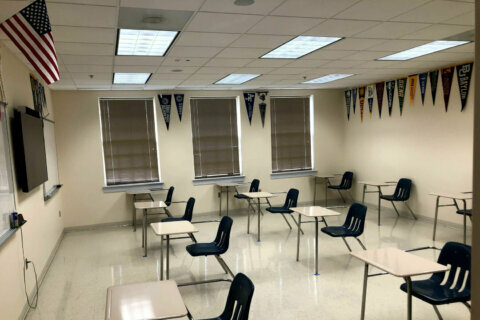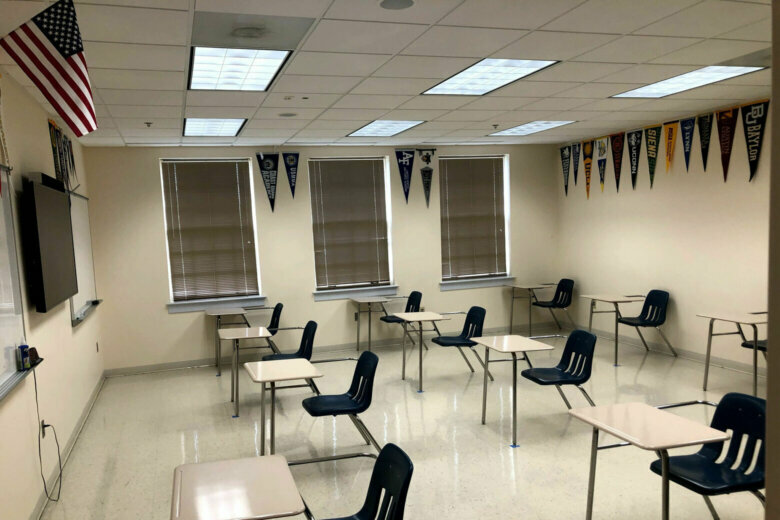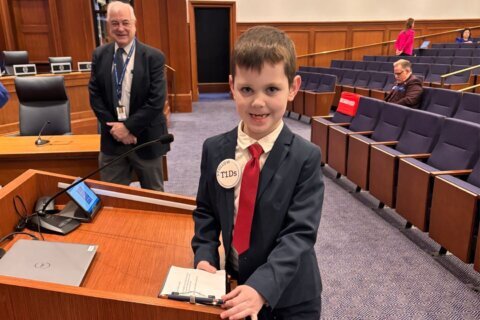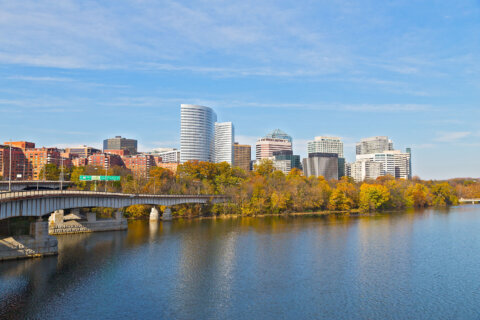
More than two months after the first students arrived on campus for in-person learning, not a single student or staff member at Randolph-Macon Academy in Front Royal, Virginia, has tested positive for COVID-19.
It hasn’t been easy, said retired Air Force Brigadier Gen. David Wesley, president of the academy which offers university-preparatory education in an Air Force Junior ROTC program.
As students were registering in mid-August and public school systems in the D.C. region began shifting toward a virtual start to the new academic year, Wesley was convinced students would be deprived of the benefits of boarding school — young people working, living, eating and striving together.
“In a sense, you can’t do boarding school unless you’re here,” Wesley said at the time.
Approaching Halloween, Wesley told WTOP that nobody at RMA has tested positive for the coronavirus this semester — so far.
“Yesterday morning, I came in and we had three students who had what looks like the stomach flu,” Wesley said. “We’re going to try to get them tested, but one of the challenges is you have to actually have several symptoms before the medical system will allow you to test.”
Wesley said local public health regulations require a doctor to order a one-day test: “A doctor has to determine that the symptoms are sufficiently similar to COVID to merit the use of an immediate test — we’ve not met that test yet.”
Instead, when a student feels ill, a campus nurse administers a GENETWORx COVID swab test.
“The sample is taken here, it’s mailed off to Richmond, and three days later you get a result back,” Wesley said.
- Sign up for WTOP alerts
- Latest coronavirus test results in DC, Maryland and Virginia
- 39 states on DC’s latest high-risk coronavirus list
- DC gyms and fitness studios adapt, hope for mild weather or close for good as winter nears
- Deadline looms, but COVID relief deal may be far off
- Fairfax County schools moving forward with plan to get more kids back in classrooms
Looking for more information? D.C., Maryland and Virginia are each releasing more data every day. Visit their official sites here: Virginia | Maryland | D.C.
The same tests were administered when students arrived in August. They remained quarantined in their rooms until the negative test results were received.
Since the beginning of the school semester, students have been required to notify RMA administrators when and where they are traveling.
“If they attend an event where there’s 10, 12, or 15 people in close quarters, inside a building, we’ll test them when they come back and quarantine them until we get a negative result,” Wesley said.
With approximately a dozen seats in a classroom, and single dorm rooms, Wesley said students continue to wear masks in class, in hallways, and in dining rooms until they sit down to eat.
“People are tired of wearing the mask, but we’re diligent in reminding them — it’s a serious student misconduct violation, not to have your mask on,” he said.
This year, because of the pandemic, students are forbidden from studying in another person’s room.
“Even if you have a mask on, you can’t study, or hang out,” said Wesley. “Those are normally really relaxed, informal times for our cadets, but we don’t allow that this semester,” because of the small size of the rooms.
Another rule Wesley has instituted — no singing inside.
“We’ve been blessed to have good weather to celebrate at chapel outside on the football field every single time since school started, but I can see that’s going to change,” Wesley said.
Asked if the singing ban was limited to religious services, performing arts, or students casually singing together in a lounge: “No singing indoors. Period.”
When it was pointed out eliminating indoor singing on campus was a harsh measure, Wesley didn’t disagree: “It is harsh — that’s why (I’m) the General,” Wesley joked, good-naturedly, “and I know the students and their parents are frustrated” by the need for safety measures.
Pointing to the rising number of COVID-19 cases locally and around the country, Wesley reminds families the safety precautions have worked to prevent infections on campus: “But only if we stick through it.”
And as if the safety measures didn’t already seem draconian, Wesley said spring break won’t be happening this year.
“Our concern is that if we release the entire student body for only a week, some will try to go home to their home countries, or they’ll go into high risk areas,” said Wesley. “And, they’ll do what kids do at spring break — have a good time.”
Instead, Wesley said the school will spread two four-day-weekends in the second semester, to limit the amount of travel students might be inclined to do.
While local school systems begin slowly bring students back to in-person learning, despite his school’s success, Wesley is reluctant to offer advice to other school systems.
“I think the difference is that public school officials have space limitations, caused by the number of students they have to handle,” Wesley said. RMA presently has approximately 250 students, although the campus could easily hold 400.
“We’ve committed to creating this (safe) environment, and unless or until I can give that same environment to 300, we’re not going to get bigger,” said Wesley. “I don’t know that public school officials have that same latitude.”
- Sign up for WTOP alerts
- Latest coronavirus test results in DC, Maryland and Virginia
- Fairfax Co. schools moving forward with plan to get more kids back in classrooms
- DC launching new coronavirus exposure app
- 39 states on DC’s latest high-risk coronavirus list
Looking for more information? D.C., Maryland and Virginia are each releasing more data every day. Visit their official sites here: Virginia | Maryland | D.C.









